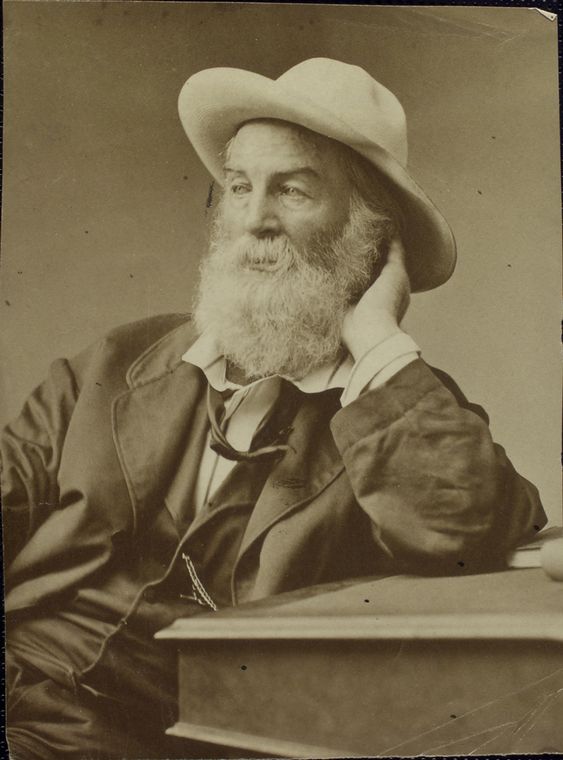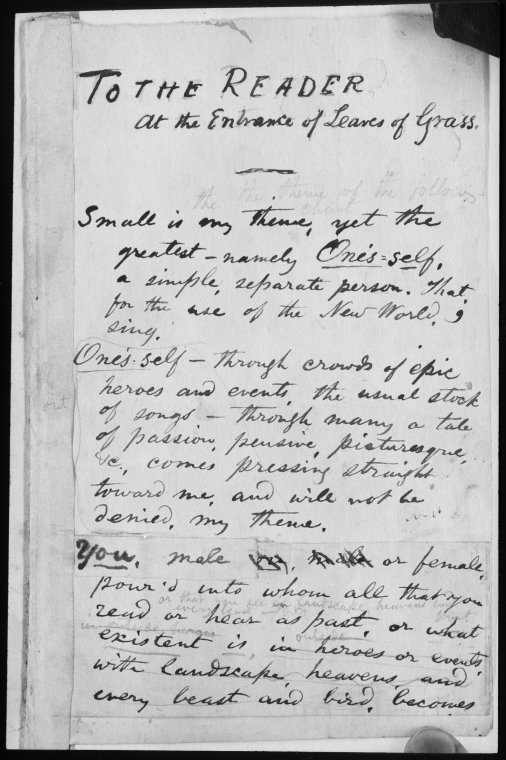Where to Start with Walt Whitman
Born on Long Island and only formally educated until the age of eleven, Walt Whitman was once called "America's poet" by Ezra Pound. He has also been cited as the "father of free verse" and is now one of the most beloved writers in the American canon. After the publication of his collection Leaves of Grass, he received a letter from one of his most vital influences, Ralph Waldo Emerson. In it, Emerson wrote, "I find it the most extraordinary piece of wit and wisdom America has yet contributed."
The Library holds some of Whitman's original works and correspondence, and many are available for viewing digitally. A collection of Whitman material can be found in our Berg Collection for English and American Literature. The Rare Book Division at the Library houses the Oscar Lion collection, which includes Whitman's annotated copy of Leaves of Grass. You can also view some of Whitman's work in our digital exhibition, Treasures of the New York Public Library, which offers an intimate glimpse into many of NYPL's most legendary collections.
Primarily known today as a poet, Whitman wrote across genre, including poetry, fiction, and nonfiction. If you're developing an interest in his writing, read on for a brief guide to getting started with Walt Whitman's work. Have a tip on how to get into Whitman? Leave it in the comment section below.
Leaves of Grass (1855)

Whitman's most well-known work, Leaves of Grass was first published in 1855 by Whitman himself. In thrall to the Transcendentalists, in particular Ralph Waldo Emerson, Whitman composed an initial version made up of twelve poems, including two of his most beloved: "Song of Myself" and "I Sing the Body Electric," taking on his love affair with freedom, individuality, sensuality, the Divine, and nature.
Over the course of his life, however, Whitman would continue to revise the collection repeatedly, and several different editions were published. At the end of his life, Whitman had offered a version of Leaves of Grass comprising nearly four hundred poems.
Whitman's annotated copy of Leaves of Grass is part of the Oscar Lion collection in the Library's Rare Book Division. This page is from the introduction.
Life and Adventures of Jack Engle (1852)

Though Whitman is known as a poet, in fact he also wrote prose. In 2017, Whitman enthusiasts received an unexpected gift, a previously unknown novel serialized in the newspaper the Sunday Dispatch would be published online for free by the Walt Whitman Quarterly Review.
The novel tells the story of a young woman named Martha who has lost her inheritance to a corrupt lawyer, and the lawyer's employee, Jack, who decides to help Martha retrieve it.
Specimen Days (1882)

Specimen Days collects some of Whitman's late work: sketches, notes, and essays from the Civil War into the last years of his life. The book gathers chunks of text that relate moments of the writer's life, such as learning to set type, to observations of the American landscape to thoughts on important intellectual influences.
Intimate and wide-ranging, the pieces of Specimen Days offers something like a biographical portrait in fragments.
Manly Health and Training (1852)

Perhaps self-help is not your first association with Walt Whitman, but in 1858 Whitman set out to write a manifesto on how to live healthfully. Written for a newspaper called the New York Atlas, the series advocates for a diet made up primarily of meat and for shoes designed for baseball players to be made available for the general public.
It was written under the pseudonym Mose Velsor and is worth a look for both the Whitman completist and the Whitman neophyte.
Read E-Books with SimplyE
 With your library card, it's easier than ever to choose from more than 300,000 e-books on SimplyE, The New York Public Library's free e-reader app. Gain access to digital resources for all ages, including e-books, audiobooks, databases, and more.
With your library card, it's easier than ever to choose from more than 300,000 e-books on SimplyE, The New York Public Library's free e-reader app. Gain access to digital resources for all ages, including e-books, audiobooks, databases, and more.
If you don’t have an NYPL library card, New York State residents can apply for a digital card online or through SimplyE (available on the App Store or Google Play).
Need more help? Read our guide to using SimplyE.


Comments
Walt
Submitted by David Heerwagen (not verified) on April 4, 2019 - 12:54pm